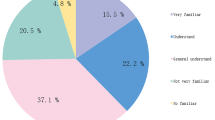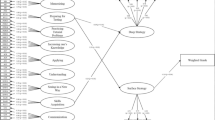Abstract
This study examines advanced medical students' perceptions of assessment practices and their ways of studying for examinations as related to their approaches to learning. This study further validates a cluster model obtained in a previous study through medical students' interviews. In this cluster model students were divided into four groups on the basis of their approaches to learning. The subjects (N = 35) were advanced medical students who volunteered to be interviewed. The interviews focused on learning strategies, study behaviour and perceptions of the learning environment. The results indicated that there were no differences in students' perceptions of the examination procedures. Students in all four groups criticised quite similarly the examination practices. However, the results showed that students in the four groups reported different ways ofpreparing for examinations and, furthermore, had different views of the most functional ways to study for them. This study brought into light problems that arise in a traditional medical curriculum, particularly concerning traditional assessment practices.
Similar content being viewed by others
References
Biggs, J. (1996). Enhancing teaching through constructive alignment. Higher Education 32: 347-504.
Brown, G., Bull, J. & Pendlebury, M. (1997). Assessing Student Learning in Higher Education. London: Routledge.
Entwistle, N.J., Meyer, J.H.F. & Tait, H. (1991). Student failure: disintegrated patterns of study strategies and perceptions of the learning environment. Higher Education 21: 249-261.
Godfrey, R.C. (1995). Undergraduate examinations-a continuing tyranny. The Lancet 345: 765-767.
Lindblom-Ylänne, S. (1999). Studying in a Traditional Medical Curriculum-Study Success, Orientations to Studying and Problems that Arise. Helsinki: Helsinki University Printing House. A doctoral dissertation.
Lindblom-Ylänne, S. & Lonka, K. (1999). Individual ways of interacting with the learning environment-Are they related to study success? Learning and Instruction 9: 1-18.
Lindblom-Ylänne, S. & Lonka, K. (2000). Dissonant study orchestrations of high achieving university students. European Journal of Psychology of Education XV: 19-32.
Lindblom-Ylänne, S., Lonka, K. & Leskinen, E. (1996). Selecting students for medical school:Whats predicts success during basic science studies? A cognitive approach. Higher Education 31: 507-527.
Lindblom-Ylänne, S., Lonka, K. & Leskinen, E. (1999): On the predictive value of entry-level skills for successful studying in medical school. Higher Education 37: 239-258.
Lonka, K. (1998). The 21st century student-An active learner? An invited theme session keynote lecture. Proceedings of the 23rd International Conference “Improving University Teaching and Learning”, Dublin, July 6-9, 1998, 63-79.
Lonka, K. (1999). The Helsinki 2000 Curriculum: Challenges and solutions in transforming a traditional curriculum into PBL. An invited keynote lecture in the symposium 'Learning Models for the Future-Examples of Medicine' (Lernmodelle der Zukunft-am Beispiel de Medicin).
Hanns-Seidel-Stiftnung eV. Munich, Germany, March 3-5, 1999. Submitted for publication.
Lonka, K. and Lindblom-Ylänne, S. (1995). Epistemologies, conceptions of learning and study success in two domains; medicine and psychology. A paper presented at the 6th Conference of the European Association for Research on Learning and Instruction (EARLI) University of Nijmegen, the Netherlands, August 26-31.
Lonka, K. and Lindblom-Ylänne, S. (1996). Epistemologies, conceptions of learning, and study practices in medicine and psychology. Higher Education 31: 5-24.
Lonka, K., Joram, E. & Bryson, M. (1996). Conceptions of learning and knowledge-does training make a difference? Contemporary Educational Psychology 21: 240-260.
Marton, F., Hounsell, D. & Entwistle, N. (eds) (1997) The Experience of Learning (2nd ed.). Edinburgh, UK: Scottish Academic Press.
Meyer, J.H.F. (1991). Study orchestration: The manifestation, interpretation and consequences of contextualised approaches to studying. Higher Education 22: 297-316.
Meyer, J.H.F. (2000). The modelling of 'dissonant' study orchestration in higher education. European Journal of Psychology of Education XV: 5-18.
Meyer, J.H.F., Parsons, P. & Dunne, T.T. (1990a). Individual study orchestrations and their association with learning outcome. Higher Education 20: 67-89.
Meyer, J.H.F., Parsons, P. & Dunne, T.T. (1990b). Study orchestration and learning outcome: evidence of association over time among disadvantaged students. Higher Education 20: 245-269.
Norman, G.R. (1997). Assessment in problem-based learning. In D. Boud & G. Feletti (eds.), The Challenge of Problem-based Learning, pp. 263-268. London: Kogan Page.
Perry, W.G. (1968). Patterns of Development in Thought and Values of Students in a Liberal Arts College. A Validation of a Scheme. U.S. Department of Health, Education, and Welfare, Office of Education, Bureau of Research, Final Report, Project no. 5-0825, Contract no. SAE 8973, April, 1968.
Ramsden, P. (1988). Context and strategy. Situational influences on learning. In R.R. Schmeck (ed.), Learning Strategies and Learning Styles, pp. 159-184. New York: Plenum Press.
Ryan, M. (1984). Monitoring text comprehension: Individual differences in epistemological standards. Journal of Educational Psychology 76: 248-258.
Van der Vleuten, C.P.M. (1996). The assessment of professional competence: developments, research and practical implications. Advances in Health Science Education 1: 41-67.
Vermunt, J.D.H.M. (1996). Metacognitive, cognitive and affective aspects of learning styles and strategies: A phenomenographic analysis. Higher Education 31: 25-50.
Vermunt, J.D. (1998). The regulation of constructive learning processes. British Journal of Educational Psychology 68: 149-171.
Vermunt, J.D.H.M. & Van Rijswijk, F.A.W.M. (1988). Analysis and development of students' skill in self-regulated learning. Higher Education 17: 647-682.
Vermunt, J.D. & Verloop, N. (1999). Congruence and friction between learning and teaching. Learning and Instruction 9: 257-280.
Weinstein, C.E. & Mayer, R.E. (1986). The teaching of learning strategies. In M.C. Wittrock (ed.) Handbook of Research on Teaching, 3rd ed., pp. 315-327. New York: MacMillan.
Author information
Authors and Affiliations
Rights and permissions
About this article
Cite this article
Lindblom-Ylänne, S., Lonka, K. Students' Perceptions of Assessment Practices in a Traditional Medical Curriculum. Adv Health Sci Educ Theory Pract 6, 121–140 (2001). https://doi.org/10.1023/A:1011422517238
Issue Date:
DOI: https://doi.org/10.1023/A:1011422517238




